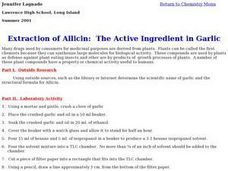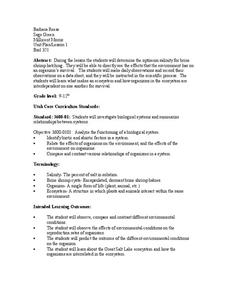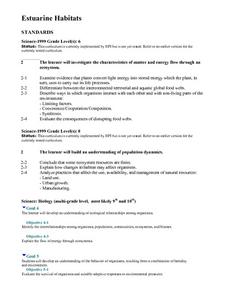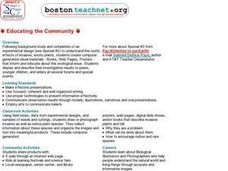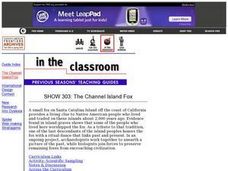Curated OER
Biodiversity Debate
Ninth graders debate the positive aspects of dam construction. They discuss how a dam changes the ecosystem. In groups, 9th graders research and gather information for a debate. They state their position and write a report supporting it....
Curated OER
The Birds and the Bees, and the Flowers and the Trees
Students examine the roles in which animals play in the pollination of plants. They recognize that flowers have male and female sexes. Students describe cross pollination and propose reasons for cross pollination through narration of a...
Curated OER
Biotic Factors
Students identify individual organism, a species, and a population within the study community. They identify biotic factors at the site and attempt to characterize the site's species diversity.
Curated OER
Extraction of Allicin: The Active Ingredient in Garlic
Students conduct research to determine the structural formula for Allicin, a component of garlic. They participate in a lab to extract Allicin from garlic and complete a set of questions about their work.
Curated OER
History of a Cookie
Students examine tree rings and then research an event for each growth ring. In this history lesson students design a timeline and research topics using books and the Internet.
Curated OER
Mapping Seamounts in the Gulf of Alaska
Pupils describe major topographic features on the Patton Seamount, and interpret two-dimensional topographic data. They create three-dimensional models of landforms from two-dimensional topographic data.
Curated OER
Leaving Home
Students explain the importance of larval dispersal and retention to populations. They collect data on organisms and examine it.
Curated OER
Mountains in the Sea Exploration No Escape
Pupils study data to hypothesis about the influence of a water circulation cell on the retention of benthic invertebrate larvae in the area of a seamount. They investigate the positives and negatives of larvae retention in this series of...
Curated OER
Hatching Brine Shrimp
Third graders investigate the environment that is considered favorable for brine shrimp hatching. The salinity level is of particular interest in the observations because the optimum level is needed for survival. They make daily...
Curated OER
Six Levels of Ecological Organization
Ninth graders describe the six levels of ecological organizations and give examples of each. They also differentiate between food chains and webs and identify trophic and consumer levels in food chain and food webs.
Curated OER
Water Quality
Students play the role of scientists testing for water quality in the area. For this ecology lesson, students determine the water sample's pH, temperature, dissolved oxygen and turbidity. They write a journal reflection after the activity.
Curated OER
Desert Xeriscaping
Seventh graders identify native species of desert vegetation, plan a xeriscape landscape, and recognize the importance of water conservation.
Curated OER
Head to Foot
Students describe the body form and major anatomical structures of squids and describe some unusual or unique features of newly-discovered deep water squid species. They infer what types of food squids use from their anatomical features.
Curated OER
the Wonder of Wetlands
Students explore the importance of the wetland ecosystem, its properties and functions, as well as, the many birds, animals, and plant life found there.
Curated OER
Lotic Environment
Students assemble a classroom river model as an example of a lotic system. They control and measure biotic and abiotic information for the in-class system and compare data with a lotic system in a natural environment.
Curated OER
Estuarine Habitats
Sixth graders study the important habitats, flora, fauna, and physical factors of coastal habitats. They compare the aquatic habitats to terrestrial habitats by researching and completing tables with the information.
Curated OER
Desert Xeriscaping
Students recognize native species of desert vegetation while examining the need for water conservation. They design and create a xeriscape landscape using a variety of materials.
Curated OER
Educating the Community
Learners research the effects of invasive and exotic plants. They create posters, webpages and books to educate the community. They present their material in different forums.
Curated OER
Toxicology 2: Finding the Toxic Dose
Students brainstorm with group partners to decide upon a chemical they would like to test, and outline a procedure for their investigation. They then present in groups their ideas to the rest of the class as well as the chemical they...
Curated OER
Biome Exchange: Send the Stuff Not The Kids
Students exchange information with students from various geographic biomes. They explore the unique ecologically significant features of the biomes and share with other students.
Curated OER
Food Type And Calories Per Square Meter
Learners compare the efficiency of producing food calories in different types of food then calculate how much land is required to supply their food for a year. They then graph the results.
Curated OER
Lotic Environment Lesson Plans
Learners create and conduct experiments on a "classroom river habitat." They manipulate the biotic and abiotic factors so that they are able to compare an artificially prepared river model to a naturally occurring lotic ecosystem.
Curated OER
SHOW 303: The Channel Island Fox
Students explore how archaeologists and other scientists use different clues to piece together a picture of the past. Students perform activities that allow them to conduct three types of scientific research. They discuss their...
Curated OER
Smog Be Gone
Students begin the instructional activity by identifying greenhouse gases. In groups, they observe and record the effect of the gases on the atmosphere and the temperature of the Earth. They participate in activities that describe the...
Other popular searches
- Plant Biology Photosynthesis
- Grade 11 Plant Biology
- Plant Biology Projects
- Plant Biology Leave
- Plant Biology Flowers
- Plant Biology Vocabulary
- Plant Biology Unit Plans
- Plant Biology Healthy Plants
- Plant Biology Powerpoint's
- Plant Biology Seeds
- Plant Biology Powerpoints
- Plant Biology Regeneration





